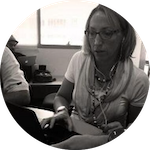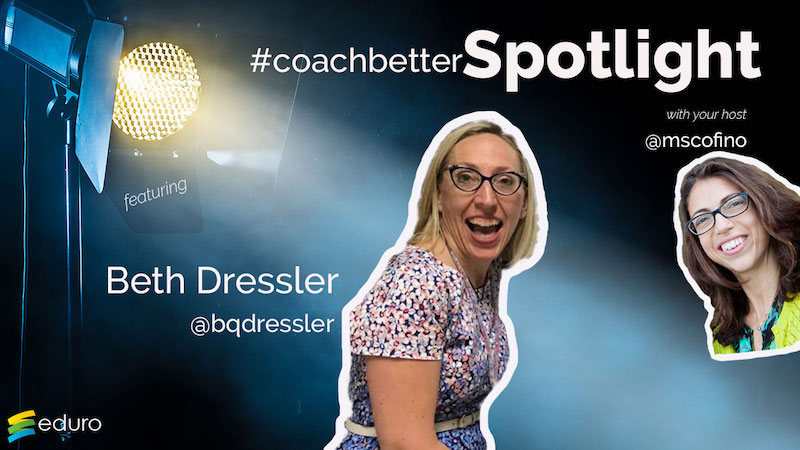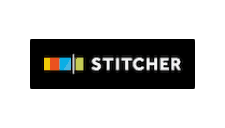Listen to Episode 43
Bonus: Watch the spotlight version of this episode on YouTube!
Featured Guest(s)
Beth Dressler

Full Show Notes
As a school leader, Beth works very closely with the coaching team at NIST. Her deep understanding of the coaching role in inquiry-driven schools provides such great insight into the power of coaches as “learning partners” for their teaching and leadership colleagues. It’s clear that Beth’s vision and passion for coaching truly support teacher agency and there’s lots to take away from this conversation that can be applied in any school setting.
What do you think coaches do?
The main role is improving teachers knowledge, understanding and skills. Working alongside teachers to get that little bit better every day. To hone in on an area that they might be struggling with, as teachers we always want to get that little bit better. Coaches come in with a birds eye view of the school AND have a relationship with the teacher, so they sometimes can see things the teachers can’t see. Through the relationship, and coming in with an inquiry stance, the coach is able to listen and learn and offer bits of feedback and tips so help them get better. “Ask more, talk less” as a “thinking partner”. “Everyone needs a coach, everyone needs a thinking partner”
How do you work with the coaches at your school?
We work together as a coaching team. 4 coaches (2 Innovation and Learning, Literacy and Math) plus the librarian. Coaches are vital to moving forward our curricular goals. Coaches are eyes on the ground in a large school. As school leaders we struggle to get into classrooms enough, it can be challenging in a large school. The coaches are an extra layer to know that we have people in classrooms building relationships and know the needs of a team and of a teacher. It’s a team based approach. Meet regularly and know what we’re aiming for, and setting goals alongside that. Coaches also support teacher learning goals – able to connect teachers to each other.
What are some good opportunities for coaches to work with you?
Coaching conversations – support through thinking – or sometimes just some advice. Support the thinking moving forward. Support setting division, school and team goals and to think through the improvement plan and how we can achieve those goals. Professional learning and connections that coaches have are instrumental in helping the school move forward.
What do you do when you don’t have the opportunity to work with a coach?
As professionals it is our responsibility to build a professional learning network, they might be in your school or six time zones away from you. To know you’ve developed those relationships, so that you have someone to lean on to help us think through issues or inspire us.
What are the essential elements for coaching success in a school? What’s needed to build a coaching culture?
Trust and relationships. Those two go hand in hand. Start with the relationship you build trust. Without those elements, it’s really hard to build a culture, and it’s harder to take risks and try things out. Without being able to take risks, it’s hard for teachers to have agency. The “what” of the curriculum is non-negotiable, but the “how” it’s done is up to the teacher (following a contemporary inquiry model). Important for people to know they can make decisions and they are trusted.
Where do coaches / does coaching fail? And what can we do about it?
When teachers think they don’t need a coach, or they think that the coach is only for teachers who are struggling. Comes back to the importance of positioning yourself as a learner, “we all make gains in our learning because we’re a learning institution”.
When the relationship isn’t so solid. Comes back to the importance of listening, the coach needs to do a lot more listening and inquiry than the teacher is doing. The power of not having a preconceived idea when you go in. It’s about figuring out the need of the teacher and being an inquirer.
Coaches have to be comfortable to live in a gray zone to sometimes do things that are “not your job” because at the end of the day that task might be a huge win with a teacher. The coach makes a huge number of decisions in a day that can make long term impact on the relationship. What hill are you willing to die on? Being super defined about your role
What makes a coach invaluable to you?
Whether it’s simple tasks like editing a video, to something more complex, like building an idea. It’s the thinking / talking partner that I use for myself as a school leader that I find invaluable. A passionate educator, who is excited about learning, who is a learner themselves.
What was your “aha” moment that shifted your perspective from not caring about coaching to being on board? Tell us about one of the first times you were coached.
Little pieces that are all threads that make up a beautiful fabric. Co-creating a workshop for the PYP with a more experienced workshop leader – came down to talking through problems, letting me do something and try it out. The feedback that she gave during the workshop was crucial. All the little pieces of what it takes to put together a workshop was fantastic.
We love sharing great content!
Get authentic, relevant, practical content delivered right to your inbox!
Connect with Us






